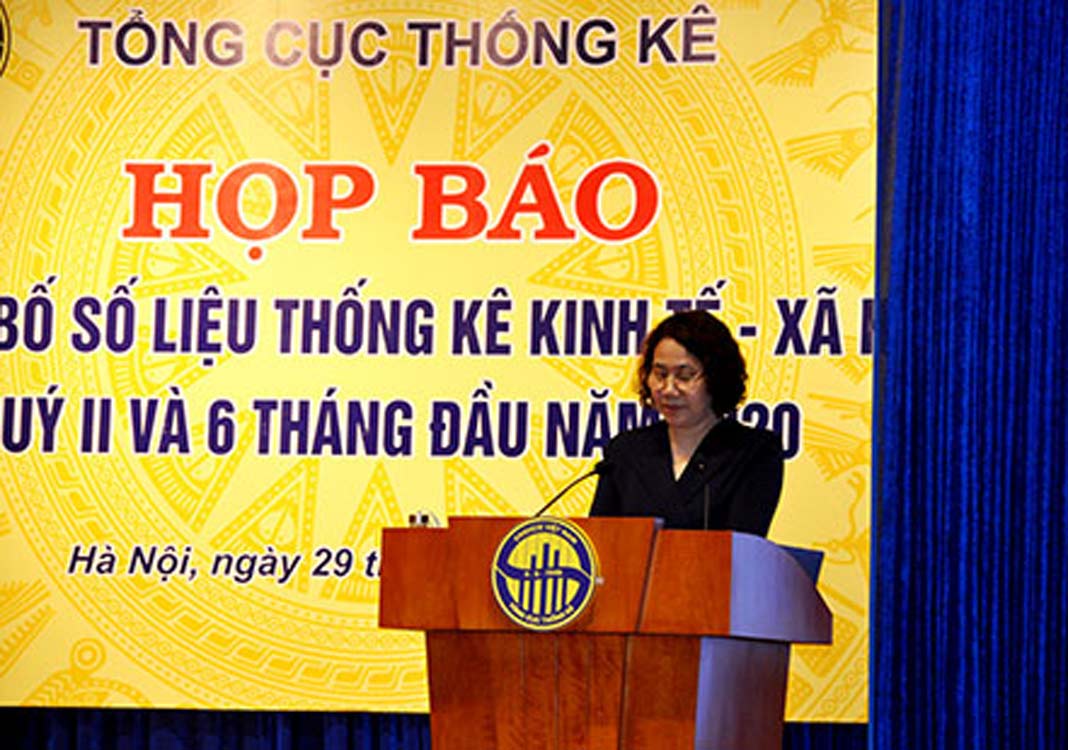HCMC – Vietnam’s economic growth in the first half of 2020 fell to its slowest pace of 1.81% in a decade, versus a 6.73% expansion during the same period last year caused by fallout from the coronavirus pandemic.
The General Statistics Office of Vietnam (GSO) held a press briefing in Hanoi on Monday to release its report on the country’s socio-economic performance for the six-month period.
The economy grew a mere 0.36% in the April-June period, compared with a 6.73% increase during the same period last year. It was also the smallest expansion in the second quarter during the 2011-2020 period.
This was attributable to the fact that the economy was hit hard by the Covid-19 pandemic in the second quarter as the Government ramped up social distancing measures, according to the GSO.
The agency reported that the agriculture, forestry and fisheries sector recorded a growth rate of 1.19% and contributed 11.89% to the overall economic growth during the six-month period. The respective figures for industry-construction are 2.98% and 73.14%; and 0.57% and 14.97% for the services sector.
The main drivers behind the economic growth in six months, according to the GSO, were the manufacturing and processing industry which expanded 4.96%; and market services, such as wholesale and retail (4.3%) and financial, banking and insurance activities (6.78%).
“The complicated development of the Covid-19 pandemic has left a negative impact on all socio-economic aspects,” noted Nguyen Thu Huong, Deputy Director-General of GSO.
Huong noted that the Government has given priority to epidemic prevention and control to safeguard public heath at the expense of economic benefits.
“This is a solid base for our economy to sustain its growth instead of falling into negative growth [like other countries],” she said.
The GSO said that Vietnam has brought the Covid-19 pandemic under control. However, the crisis still has a direct impact on trade, tourism, transport and import-export in other parts of the world.
Businesses are facing a shortage of raw materials, resulting in a reduction in their production scale or even operational suspension, said the GSO.
The agency added that the pressure to control inflation and rising unemployment and underemployment would affect social security. Therefore, a proactive approach is needed to stem a second wave of Covid-19.
The country’s headline consumer price index in the first half of this year rose by 4.19% year-on-year, the highest first-half increase recorded since 2016.
Vietnam is seeking to resume its economic activity after recording only 355 Covid-19 cases and no virus-related deaths. The country has not seen any community infections for more than two months.
The International Monetary Fund forecast last month that Vietnam’s economic growth would slow down to 2.7% in 2020.
Meanwhile, the Asian Development Bank predicted Vietnam would grow 4.1% this year, as containment measures to address the coronavirus pandemic hamper economic activity and weaken external demand.
Speaking at a conference in May, Prime Minister Nguyen Xuan Phuc said Vietnam is expecting a dramatic economic recovery following the coronavirus pandemic, with the GDP growth forecast at 5%.
Measures to boost economy
The GSO urged the Government to undertake major measures to rev up the economy, including cutting the red tape for enterprises to have easier access to supporting policies from the Government.
The GSO also suggested the Government speed up the disbursement of public investments and tackle difficulties in key, large-scale projects, which have seen slower-than-expected progress toward disbursement.
The move is intended to implement strategies for infrastructure and improve production capacity.
Also, measures need to be taken to prevent new outbreaks of African swine fever, a contagious viral disease impacting only pigs.
The GSO suggested the Government encourage pig-breeding firms to raise the number of pigs in order to meet the domestic demand of pork and reduce their prices to control inflation.
The Government should also stimulate investment in firms, which produce goods for export to help them prepare their products, as other countries will soon reopen their markets.
They are expected to enjoy benefits from the free trade agreement between Vietnam and the European Union, which is set to take effect in August this year.
By Gia Phong









